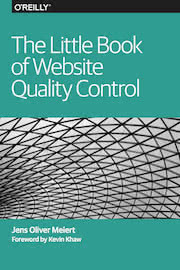About the Mindset for Quality
Published on November 17, 2016 (↻ July 14, 2023), filed under Web Development (RSS feed for all categories).
In my view, quality starts with quality thinking. (Perhaps everything does start with thinking, but that’s when the philosopher in me would win the upper hand.) Quality thinking is broad, but it quickly leads to a quality mindset. This mindset, now, I’ve long regarded as critical, and in The Little Book of Website Quality Control (updated) I gave it a few good paragraphs. As follow.
The most important factor when it comes to practical quality is the mindset. The greatest quality initiative is not worth much if it’s not clear to the team and enterprise why quality matters, and how quality is beneficial for them. The key to a conducive mindset is communication; a potential trap [are] rewards.
Communication
Communication is the primary way to spread and instill a mindset of quality, with quality as the goal and guiding principle.
This communication should sporadically repeat, but doesn’t need to consist of overt reminders on why quality matters and how it benefits everybody. If we want to repeat the essence of both answers here, then: quality is important to deliver work that is good by professional standards and benefits everyone, because products of quality are easier and more pleasant to consume and work with.
Communication is, for that reason, important because we all benefit from being reminded of our priorities.
Based on this, communication can now range from bylines in regular company and team communications, thanking everyone for the vigilance to produce good work, to dedicated emails emphasizing the goal and importance of quality.
Rewards
Rewards, then, are no key for a quality mindset. We should avoid rewards. Rewards might compel people to participate in quality-related events but they don’t necessarily compel people to embrace quality (in fact, they rarely do). They seem to distract from, rather than point to the message.
I’ve had some such experiences with international teams, where rewards did help draw attention to quality-related initiatives, but didn’t lead to a better understanding of, or a higher motivation, for more quality. What was more effective was communication, notably through managers. Hierarchy and authority can, of course, be great facilitators in our quest to improve the quality of our work.
The Little Books, in which I’m not only covering website quality control but also web frameworks and coding guidelines, are free. Get your own copies!
About Me

I’m Jens (long: Jens Oliver Meiert), and I’m a frontend engineering leader and tech author/publisher. I’ve worked as a technical lead for companies like Google and as an engineering manager for companies like Miro, I’m close to W3C and WHATWG, and I write and review books for O’Reilly and Frontend Dogma.
I love trying things, not only in web development (and engineering management), but also in other areas like philosophy. Here on meiert.com I share some of my views and experiences.
If you’d like to do me a favor, interpret charitably (I speak three languages, and they do collide), yet be critical and give feedback for me to fix issues, learn, and improve. Thank you!
Read More
Maybe of interest to you, too:
- Next: Highlights From Scovel Shinn’s “Your Word is Your Wand”
- Previous: Stop Using the Old “Clearfix”
- More under Web Development
- More from 2016
- Most popular posts
Looking for a way to comment? Comments have been disabled, unfortunately.

Get a good look at web development? Try WebGlossary.info—and The Web Development Glossary 3K (2023). With explanations and definitions for thousands of terms of web development, web design, and related fields, building on Wikipedia as well as MDN Web Docs. Available at Apple Books, Kobo, Google Play Books, and Leanpub.

